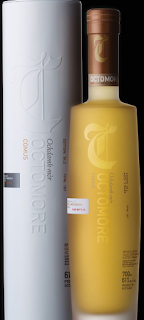So, Bruichladdich Octomore 4.2 'Comus', and indeed the entire Octomore range, has gained a cult following in the whisky world, and for good reason. Bruichladdich's Octomore range is widely accepted as being the most heavily peated single malt in the world, by ppm phenols (see here for explanation). The current record holder is the 5.1 bottling, which weighed in at a whopping 169 ppm. In comparison, Ardbeg and Laphroaig 10 year olds are around 40-55 ppm. So this is very peaty and smoky stuff, but there is also much more to the story.
Expertly distilled and matured, albeit only for 5 years, with the exception of the super-expensive 10 year old, the Octomore whiskies are nowhere near as aggressive and confronting as you might expect from the numbers on the label. Mostly bottled at or around cask strength, and with very high ppm, they are surprisingly approachable and even tame, more of a friendly giant rather than a nasty one. Note that if the version you are looking at is a '_.1', it has been matured only in bourbon casks, whereas if it is a '_.2' it has undergone an additional maturation, or finish, in a different cask of some sort such as the wine casks in this case.
The 4.2 'Comus' (named after a play about a demigod, apparently), has been finished in a Chateau d'Yquem (pronounced "de-kem") Sauternes cask, which is a highly regarded, and very expensive, sweet french wine. But has it worked?
Bruichladdich Octomore 4.2 'Comus', 5 years old, 61%, Islay, Scotland.
Cask strength, 167ppm, aged 5 years, finished in Sauternes wine cask. No colouring or chill-filtering.
(tasted with a drop of water)
Colour: Beautiful, bright yellow gold
Texture: Oily, syrupy, the legs are near-permanent! No movement at all.
Nose: Mouth watering! Peaty & smoky with salty sea spray, then big sweet fruit. Ripe, juicy pears and grapes. The peat makes itself known but is not too aggressive, the fruit syrup is the main player here. Likewise not a great deal of alcohol heat for the young age and high ABV, definitely good quality spirit and casks. A little floral as well, would make a great aftershave! (Bruichladdich please make out royalty cheques to Peated Perfection, thanks.)
Taste: Big peat and smoke, salty, but a light floral sweetness, more sweet ripe pears and botrytis white grapes (a natural fungus which sweetens and concentrates the juice of the grapes). Very well balanced, some mild oak and more fruit syrup, with the peat present the whole way through.
Finish: Sweet, oaky wine. A little residual heat gives way to sea breezes, and lovely sweet peaty magic.
Score: 3.5 out of 5.
Notes: Yes, it has worked. This is very good stuff. But having tried a few now, it's not my pick of the Octomore range. That prize goes to the mighty 5.1 heavyweight champion.
Also it's very expensive for such a young whisky, but is of unquestionable quality, and probably not a bad long-term investment for the collector. If you enjoy sweet wine, but wish it had some peat smoke and some more strength, this is the stuff for you. A little hard to find these days, but Dan Murphy's still has some, and it probably won't last long.
As an interesting little tidbit, have a go at Jim McEwan's, (Bruichladdich's head distiller) party piece. Stick your finger tip in the top of the whisky in the glass, then hold it above the glass. With most good quality, non-chill filtered, higher strength whiskies, the liquid won't drip or move from your finger tip. But, if you put your finger in to the bottom of the glass and do the same, it may drip. This apparently is due to the natural oils in the spirit and cask being retained through distillation and maturation, but hey it just looks pretty darn cool. Try it next time for a conversation starter. Cheers!

No comments:
Post a Comment
Share your thoughts & opinion on my opinion!